
- Schengen Visa Types

How long is the Schengen visa valid?
Schengen visas have a limited validity period, which depends on the trip’s purpose and the visa category itself. The Schengen states issue short- and long-stay visas.
A short-stay visa is issued to a foreigner for the first trip to one of the countries of the agreement. A long-stay visa can be issued to those who have visited Schengen several times and have not violated visa requirements. But the decision is always made by the embassy of the country where the applicant applies.
If a Schengen visa is issued for up to 5 years, this does not indicate the possibility of staying in the Schengen states for all 5 years. The validity period of a visa and the length of stay in countries are different concepts.
The duration of stay in the Schengen Area also depends on the visa type ― up to a maximum of 90 days every 180 days. For example, if a visa is issued for five years, a foreigner can enter the region as many times as they want. The main thing is not to stay in the Schengen Area for more than 90 days within 180 days.
To avoid confusion about validity terms and stay terms, we are presenting the Schengen visa types in the table below.
A Schengen visa is pasted into a foreign passport and is often called a visa sticker. The visa has a special hologram, which is forgery protection.
The sticker contains information about the owner and the country that issued the visa. The visa validity area, validity period, duration of stay, and purpose of the visit must be specified.

A visa is required for all citizens of countries not part of the Schengen Area. There are exceptions: citizens of countries with which an agreement on visa-free entry to the Schengen Area was signed. For example, countries like Cyprus, Grenada, and Dominica.
Foreigners receive a visa at the embassies and consulates of the member states of the Schengen agreement. If the applicant plans to visit more than one country, it is recommended to submit documents to the representative office of the Schengen state where they will spend the most time.
With a Schengen visa, you can travel to Austria, Belgium, Croatia, the Czech Republic, Denmark, Estonia, Finland, France, Germany, Greece, Hungary, Iceland, Italy, Latvia, Liechtenstein, Lithuania, Luxembourg, Malta, the Netherlands, Norway, Poland, Portugal, Slovakia, Slovenia, Spain, Sweden, and Switzerland.
The visa also allows you to visit countries that are:
- candidates to join the European Union — Albania, Romania, Macedonia, Cyprus, and Bulgaria.
- de facto belong to the Schengen Area due to the peculiarities of their location ― Andorra, Monaco, Vatican City and San Marino.
However, if a foreigner is travelling with a single-entry visa, they will not be able to use it to return to the territory of a Schengen Area state.

Three types of the Schengen visa depending on the purpose of your trip:
- Uniform Schengen visa (USV);
- Limited territorial visa (LTV);
- National visa.
A visa type depends on the visit’s purpose and the stay’s duration. All types are indicated by the letters: A, C, and D .
Type A visa ― transit, Type C ― short-stay, allows you to stay in the Schengen states for up to 90 days within six months. Type D visa is a national visa issued for a longer stay in a Schengen country, for example, to study.
Validity periods of the visa are limited and depend on the purpose of the trip and the category. For example, a transit visa is issued for up to 2 days. The maximum validity period of a Schengen visa is 5 years. Specialists of the embassy and consulate decide on the deadline.
The duration of stay in the Schengen states is limited : foreigners can stay in the agreement countries for up to 90 days every 180 days. You will need to obtain a national Type D visa for a longer stay.
“A visa sticker” is a Schengen visa’s second name. The visa itself is pasted into the passport. Each sticker contains a unique hologram that confirms the authenticity of the visa.
The sticker must contain information about the owner and the country that issued the visa. The details are the country and city of issuance, visa validity area, validity period and duration of stay, as well as the purpose of the visit.
The visa is issued to citizens from countries outside the Schengen Area.
There are exceptions for the countries that have signed an agreement on visa-free entry with the Schengen Area. Citizens of these countries do not need to obtain a Schengen visa, for instance, Cypriots, Grenadians or Montenegrins.
Foreigners apply for a visa at the consulate of one of the Schengen states. Documents are submitted to the country’s consulate, where the longest stay is planned during the first trip.

Visa Traveler
Exploring the world one country at a time
Schengen Visa for Tourists: Everything You Need to Know
Updated: October 19, 2023
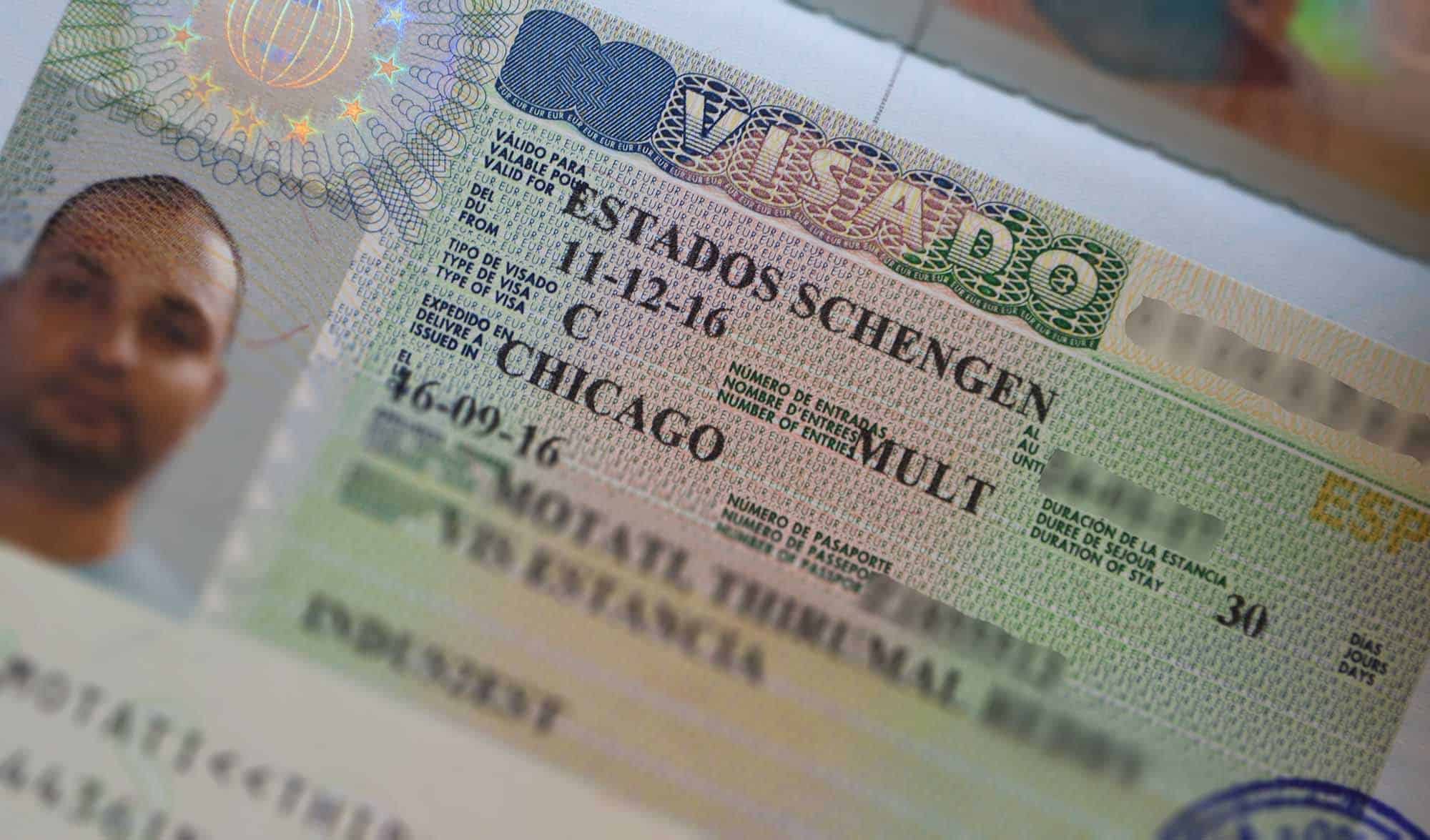
The Schengen visa is a type of visa that allows you to travel freely within the Schengen area. As per the UN, the continent of Europe is comprised of 44 countries. Of these, 27 countries are part of the Schengen agreement. The Schengen agreement abolished internal borders between these 27 countries.
A Schengen visa is a unified visa for short stays (up to 90 days) for these 27 European countries. Therefore, a Schengen visa is the only visa you will need to travel to any of these 27 countries.
Table of Contents

BONUS: FREE eBOOK
Enter your name and email to download the FREE eBOOK: The Secret to VISA-FREE Travel
Opt in to receive my monthly visa updates
You can unsubscribe anytime. For more details, review our Privacy Policy.
Your FREE eBook is on it’s way to your inbox! Check your email.
SCHENGEN VISA POLICY
The Schengen visa policy was introduced in 1995 which abolished internal borders between the Schengen countries.
Once you have obtained a Schengen visa, you can travel freely between the Schengen member countries without any border controls. For example, if you enter France and would like to go to Germany, you will not pass through passport controls at the France-Germany border.
Keep in mind that the Schengen visa policy only applies to the Schengen area and not to the entire European Union.
Schengen visa countries
There are currently 27 countries in the Schengen area that you can visit with a single Schengen visa. Below is the list of countries.
- Czech Republic
- Liechtenstein
- Netherlands
- Switzerland
Apart from the above 27 Schengen member countries, you also travel to 50 non-Schengen countries visa-free using a Schengen visa .
SCHENGEN VISA TYPES
Those intending to visit the Schengen countries for tourism must either be visa-exempt or hold a valid Schengen visa from the embassy.
- Visa EXEMPTION (ETIAS from 2024)
- Type-A (Airport Transit Visa)
- Single-entry
- Double-entry
- Multiple-entry
- Type-D (Long Stay Visa for stays more than 90 days)
- Limited Territorial Schengen Visa
For this guide, we will focus only on visas for tourism intent, that is Type-C Uniform Schengen visas.
SCHENGEN VISA REQUIREMENTS
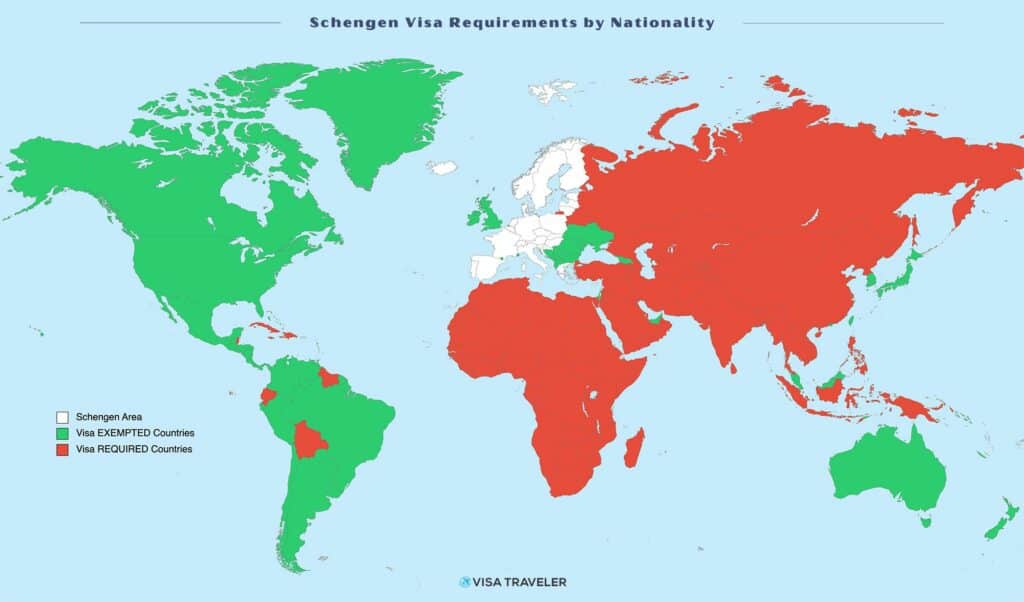
Minimum passport validity required to enter the Schengen area
Passport must be valid for at least 3 months from your planned departure from Schengen area.
Example: If your trip is from Mar 10 to Mar 20, your passport must be valid at least until Jun 20.
Visa EXEMPT nationalities
90-day entry.
- Antigua And Barbuda
- Bosnia And Herzegovina
- El Salvador
- Marshall Islands
- New Zealand
- North Macedonia
- Solomon Islands
- South Korea
- St Kitts And Nevis
- St Vincent and The Grenadines
- Timor-Leste
- Trinidad And Tobago
- United Arab Emirates
- United States of America
- United Kingdom
- Vatican City
Visa REQUIRED nationalities
- Afghanistan
- Burkina Faso
- Central African Republic
- Congo, Dem. Rep. of
- Congo, Rep. of
- Cote d’Ivoire
- Dominican Republic
- Equatorial Guinea
- Guinea-Bissau
- North Korea
- Papua New Guinea
- Philippines
- Sao Tome And Principe
- Saudi Arabia
- Sierra Leone
- South Africa
- South Sudan
- Turkmenistan
IMPORTANT Palestine and Kosovo are not recognized by at least one Schengen member state. If you are a Palestinian or Kosovo national, please inquire at your nearest Schengen consulate for visa requirements for your passport.
SCHENGEN VISA EXEMPTION (ETIAS FROM 2024)
Currently, 62 nationalities can enter the Schengen area without a visa. Though you do not require a visa, you must consider the total duration of your stay in the Schengen area and must carry the mandatory documents.
Duration of Stay in Schengen Area – the 90 days/180 days rule
Non-EU Passport holders who are visa EXEMPT are allowed to stay in the Schengen area countries for up to 90 days within a period of 180 days. This “90 days in any 180 days” applies to all short-stay visitors to the Schengen area.
- Stays in EU countries that are NOT part of the Schengen area (Bulgaria, Romania, Cyprus and Ireland) are not counted in calculating the period of stay.
- Stays in non-EU countries that are part of the Schengen area (Iceland, Liechtenstein, Norway and Switzerland) are counted in calculating the period of stay compliance with the 90-day / 180-day rule.
- Both the day of entry and the day of exit are counted in the calculation.
- The 180-day period is referenced backward from the day of checking.
- A simple rule of thumb is, if you are out of the Schengen area for a continuous period of 90 days allows you a new stay of 90 days.
You can use the Schengen calculator to determine the number of days you are allowed to stay in the Schengen area. Here is the manual on how to use the Schengen calculator.
Documents to carry
Visa EXEMPT individuals must carry the following documents when entering the Schengen member states.
- Valid passport
- Proof of onward travel
- Proof of accommodation
SCHENGEN VISA FROM THE EMBASSY
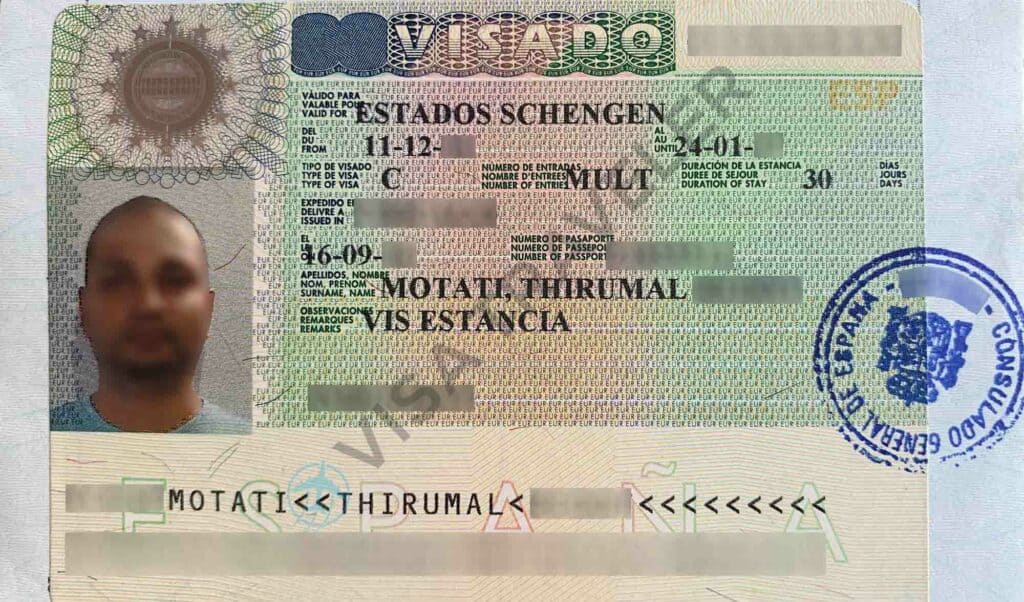
Currently, 104 non-EU nationals require a visa to enter the Schengen area. These nationals must be in possession of a Schengen visa when entering the Schengen zone.
Validity of Schengen Visa
The Schengen visa validity depends on whether you are a first-time applicant or a subsequent applicant.
First-time application: If you are applying for the first time, your visa will be valid for the exact number of days you have asked for. In some instances, you may get a few buffer days as additional.
For example, if your itinerary is 12 days, your visa will be valid for exactly 12 days.
As a first-time visa applicant, I suggest adding a few extra days to your itinerary so you will get a few extra days on your visa validity. That way, you can have some flexibility in your travel plans.
First-time Schengen visas are usually single-entry or double-entry.
Subsequent applications: If you are applying for the second or third time, you may likely get a visa valid for 90 days. The visa may likely be multiple-entry.
Rules for obtaining Schengen visa valid for 1, 2 or 5 years
- To obtain a 1-year Schengen visa, you must have obtained and used 3 Schengen visas within the last 2 years
- To obtain a 2-year Schengen visa, you must have obtained and used a 1-year Schengen visa within the last 2 years
- To obtain a 5-year Schengen visa, you must have obtained and used a 2-year Schengen visa within the last 3 years
Duration of Stay in Schengen area – the 90 days/180 days rule
Visa-required passport holders are allowed to stay in the Schengen area for up to 90 days within a period of 180 days. This “90 days in any 180 days” applies to all short-stay visitors to the Schengen area.
- Stays in non-EU countries that are part of the Schengen area (Iceland, Liechtenstein, Norway and Switzerland) are counted in calculating the period of stay compliance with the 90 days / 180-day rule.
Where to apply for Schengen visa
Most tourists plan to travel to more than one country during their Europe trip. The Schengen visa is valid for 27 countries, so you must first determine your Schengen country of application. This helps greatly in avoiding visa delays and refusals.
Follow the below guidelines to determine your country of application.
CASE 1: If you plan to visit only one Schengen country, you must apply for your visa at the consulate of that particular country.
Example: If you are traveling to Spain only, then you must apply for your visa at the Spain Embassy or Consulate.
CASE 2: If you plan to visit several Schengen countries, you must apply for your visa at the consulate of the country of your main destination (the country where you will be spending most days).
Example: If your itinerary is 10 days of which 4 days in Spain and 6 days in France, then you must apply for your visa at the French consulate since you will be spending more time in France.
CASE 3: If you intend to visit several Schengen countries but do not have a main destination (same amount of days in each country) then you should apply for your visa at the consulate of the country of your first point of entry.
Example: If your itinerary is 10 days of which you will be spending 5 days in the Netherlands first and 5 days in France after, then you must apply for a visa at the Netherlands Consulate since the Netherlands is your first port of entry.
When to apply for Schengen visa
You must apply for your Schengen visa no later than 15 days prior to your travel. Otherwise, your application will not be accepted.
You can apply for your visa up to 6 months in advance. So, apply as soon as you can to avoid delays, refusals and disappointments.
Schengen Visa Application Process
There is a plan to implement online systems of Schengen visas. But as of now, the visa can only be applied in person. Visa application is a 4 step process
- Fill out your Schengen visa application form 14076-02 (online or offline)
- Schedule an in-person Schengen visa appointment (at the consulate or visa agent such as VFS Global)
- Appear in person to submit your visa application, documents, biometrics and visa fee
- Pick up your original passport with the approved visa.
You can apply for a Schengen visa through a visa/travel agency in some countries. Travel agencies that offer vacation packages to Europe usually are allowed to apply for the visa on your behalf.
Documents required for Schengen visa
The following documents are required for your Schengen visa.
- Filled and signed visa application form (online or downloadable from the consulate page)
- Original passport
- Copy of the visa/residence permit if applying in a third country
- One recent passport-size photo
- Confirmed round-trip flight reservation
- Proof of health insurance
- 3-month bank statement
- 3-month salary slips
- Original signed employment letter
- Cover letter with a detailed itinerary
Application Form
Filling out the application form can be done online or offline depending on the Schengen country. For example, the application form for France is online whereas for Spain, it’s paper.
Photo Requirements
The photo must be 4.5cm x 3.5cm. That is, 4.5cm high and 3.5 cm wide. The face must be 3.2 to 3.6cm or 70-80% of the photo.
Proof of Health Insurance
It’s MANDATORY to submit travel medical insurance for Schengen visa . You must attach a certificate of travel health insurance in the Schengen area or worldwide with 100% coverage with no deductibles or co-pays.
It must have a minimum coverage of €30,000 EUR for medical, hospitalization, emergencies and repatriation services.
You can purchase Schengen travel insurance from any online provider. You can cancel and get a refund if your visa is denied. Once you purchase the travel insurance for your desired dates, you can download the visa letter that you can submit with your visa application.
Recommended Schengen visa insurance:
- VisitorsCoverage | Meets Schengen visa insurance requirements | Costs $1 a day
Schengen Visa Fee
The Schengen visa fee for an adult is approximately €80 EUR. For children between the ages of 6 and 12, it’s €40 EUR. Children under the age of 6 are exempt from paying the visa fee.
The fee must be paid in local currency, in the form of cash or bank money order. Most Schengen consulates have outsourced the visa process to VFS or BLS. Therefore, in addition to the visa fee, you may have to pay a fee for biometric collection and courier services.
Schengen Visa Processing Time
Schengen visa processing can take from 15 calendar days to 45 calendar days depending on the consulate, country or agent. Apply no later than 15 days prior to your travel. Otherwise, your application will not be accepted.
ENTRY AND EXIT PROCEDURE AT THE AIRPORT
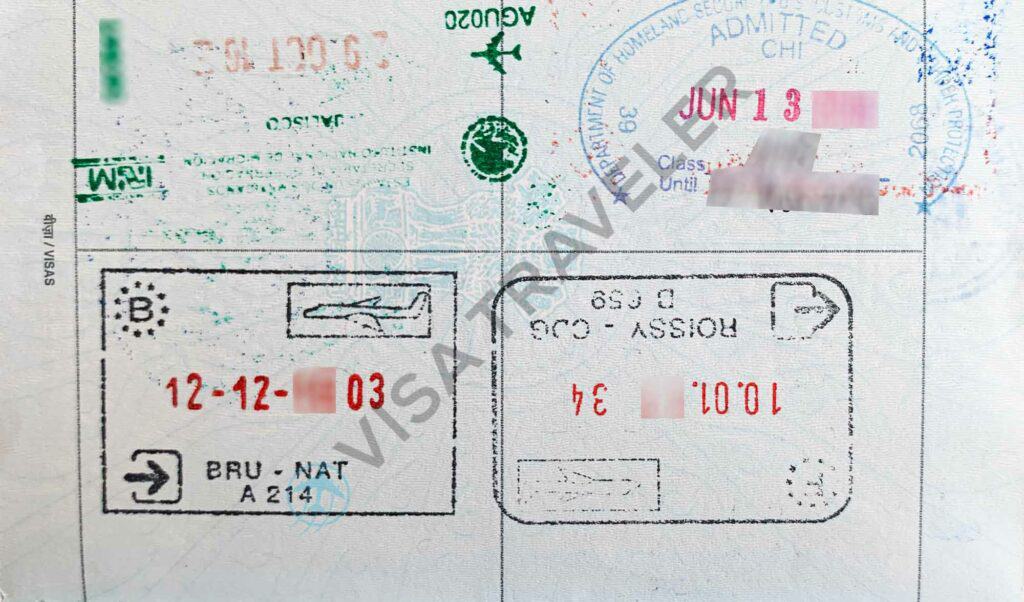
Entering Schengen Zone by Air
You do not need to fill in any arrival/departure card on entering the Schengen area. Do not panic if your flight attendant did not give you an arrival/departure card on your flight.
At the immigration, you will generally be asked about your final destination, places you will be visiting and the number of days you are planning on staying. You might also be asked if it is your first time in Europe.
The immigration officer will stamp your passport upon arrival. The number of days you are allowed to stay will not be marked on your passport.
As always, carry a copy of your return ticket and hotel booking just in case. If you are traveling on a one-way ticket, don’t forget to get proof of onward ticket .
Leaving Schengen Zone by Air
You must go through passport control on exiting the Schengen area. You will not be asked any questions unless you have overstayed your visa. Passport control is fairly quick, about 10-15 minutes depending on the airport.
FREQUENTLY ASKED QUESTIONS (FAQs)

What is the minimum bank balance required for a Schengen visa?
The minimum bank balance required for a Schengen visa depends on the country you are applying from and the duration of your stay. As a general rule, you should have at least €60 per day for your stay in the Schengen area. This should cover your travel expenses, including accommodation, food, and transportation.
Does Schengen visa cover Switzerland?
Yes, the Schengen visa covers Switzerland. Switzerland is a member of the Schengen Area. You can travel to Switzerland and other Schengen countries with a single visa.
Which Schengen visa is hardest?
There is no specific Schengen visa that is considered the hardest to obtain. But visa refusal statistics show that Norway, France and Belgium have the highest refusal rates.
Which country gives fastest Schengen visa?
The processing time for a Schengen visa may vary depending on the country you are applying from and the purpose of your visit. However, some countries may have faster processing times than others. For example, Estonia, Latvia, and Lithuania are known to have relatively fast processing times.
Which country gives Schengen visa easiest?
There is no specific country that gives Schengen visa easiest. But visa refusal statistics show that Finland, Hungary, Estonia and Poland have the lowest refusal rates.
Do US citizens need a visa to enter the Schengen area?
No, US citizens do not need a visa to enter the Schengen area. US citizens can travel to the Schengen territory for up to 90 days within any 180-day period without a visa for tourism or business purposes.

Europe is usually the first choice for most first-time international travelers. It’s a dream for most people to visit European countries at least once in their lifetime. Europe has such an impeccable beauty, history, art, and cuisine.
A Schengen visa allows you to travel freely within the Schengen area, comprised of 27 European countries. Non-EU nationals who are visa-exempt and visa-required are allowed to stay in the Schengen zone for up to 90 days within a 180-day period.
Schengen visas are single, double or multiple-entry visas. First-time Schengen visas are limited in validity, but subsequent visas are 90 days to 5 years of validity.
- European Comission, Migration and Home Affairs
- European Union Law (EUR-Lex), Visa Code
WRITTEN BY THIRUMAL MOTATI

Thirumal Motati is an expert in tourist visa matters. He has been traveling the world on tourist visas for more than a decade. With his expertise, he has obtained several tourist visas, including the most strenuous ones such as the US, UK, Canada, and Schengen, some of which were granted multiple times. He has also set foot inside US consulates on numerous occasions. Mr. Motati has uncovered the secrets to successful visa applications. His guidance has enabled countless individuals to obtain their visas and fulfill their travel dreams. His statements have been mentioned in publications like Yahoo, BBC, The Hindu, and Travel Zoo.
PLAN YOUR TRAVEL WITH VISA TRAVELER
I highly recommend using these websites to plan your trip. I use these websites myself to apply for my visas, book my flights and hotels and purchase my travel insurance.
01. Apply for your visa
Get a verifiable flight itinerary for your visa application from DummyTicket247 . DummyTicket247 is a flight search engine to search and book flight itineraries for visas instantly. These flight itineraries are guaranteed to be valid for 2 weeks and work for all visa applications.
02. Book your fight
Find the cheapest flight tickets using Skyscanner . Skyscanner includes all budget airlines and you are guaranteed to find the cheapest flight to your destination.
03. Book your hotel
Book your hotel from Booking.com . Booking.com has pretty much every hotel, hostel and guesthouse from every destination.
04. Get your onward ticket
If traveling on a one-way ticket, use BestOnwardTicket to get proof of onward ticket for just $12, valid for 48 hours.
05. Purchase your insurance
Purchase travel medical insurance for your trip from SafetyWing . Insurance from SafetyWing covers COVID-19 and also comes with a visa letter which you can use for your visas.
Need more? Check out my travel resources page for the best websites to plan your trip.
LEGAL DISCLAIMER We are not affiliated with immigration, embassies or governments of any country. The content in this article is for educational and general informational purposes only, and shall not be understood or construed as, visa, immigration or legal advice. Your use of information provided in this article is solely at your own risk and you expressly agree not to rely upon any information contained in this article as a substitute for professional visa or immigration advice. Under no circumstance shall be held liable or responsible for any errors or omissions in this article or for any damage you may suffer in respect to any actions taken or not taken based on any or all of the information in this article. Please refer to our full disclaimer for further information.
AFFILIATE DISCLOSURE This post may contain affiliate links, which means we may receive a commission, at no extra cost to you, if you make a purchase through a link. Please refer to our full disclosure for further information.
MORE VISA GUIDES

UNITED KINGDOM

VIEW ALL VISA GUIDES
- Cookie Policy
- Copyright Notice
- Privacy Policy
- Terms of Use
- Flight Itinerary
- Hotel Reservation
- Travel Insurance
- Onward Ticket
- Testimonials
Applying for a Schengen visa
The information on this page is indicative and not exhaustive. Interested parties should seek additional information from the Embassy or Consulate of the country of their main destination.
What is a Schengen visa?
A Schengen visa is an entry permit for a short, temporary visit of up to 90 days in any 180-day period. A Schengen visa can be obtained in the form of a single-entry visa , allowing the holder to enter the Schengen area once, or a multiple-entry visa , which is granted for several visits to the Schengen area for as long as it is valid.
The short-stay visa calculator can be used to calculate the remaining period of allowed stay. The user's guide will help you navigate the calculator with step by step instructions and practical examples.
An airport transit visa allows its holder to connect through the international transit area of an airport in the Schengen area during a stopover or a change of flights. This visa does not allow its holder to leave the international transit area of an airport.
Who needs to apply for a Schengen visa?
Certain non-EU citizens must hold a short stay visa when traveling to the Schengen area. The EU has a common list of countries whose citizens are required to hold a visa when crossing its external borders. There are national derogations from the visa requirements for certain travellers.
Some third-country nationals must also hold an airport transit visa when connecting through the international transit areas of airports located in any of the Schengen States . For citizens of certain additional countries, an airport transit visa is required when connecting through the international transit areas of airports located in some of the Schengen States . There are some categories of persons who are exempt from the requirement to hold an airport transit visa (see Article 3(5) of the Visa Code ).
Where to apply?
You must lodge the application for a Schengen visa at the Consulate of the country you intend to visit . If you intend to visit more than one Schengen States, you should apply at the Consulate of the country where you will spend the longest period of time.
If you intend to visit several Schengen States and the stays will be of equal length, you must apply at the Consulate of the first country you will visit.
As a general rule, you must apply for a Schengen visa at the Consulate with territorial competence for the country in which you legally reside.
More information for each Schengen country can be found on dedicated websites
When to apply.
The application must be submitted to the Consulate at least 15 days before the intended journey and cannot be lodged earlier than six months prior to the start of the intended journey. You may have to book an appointment before lodging the application.
What documents are needed to apply?
- A valid passport. The passport’s expiry date should be at least 3 months after the date of your departure from the Schengen area. In the case of multiple-entry visa, the passport’s expiry date should be at least 3 months after your departure from the last country visited.
- A visa application form .
- A photo in compliance with ICAO standards .
- Medical insurance covering emergency medical, hospitalisation and repatriation (including in case of death).
- Supporting documents relating to the purpose of your stay, evidence of financial means during your stay, your accommodation and your will to return to your home country after your stay.
- Your fingerprints will be collected when you submit your application (exemptions exist for specific categories of applicants).
- Additional documents can be requested by the Consulates.
How much does a visa cost?
- 80€ for adults;
- 40€ for children aged 6-12;
- 35€ for applicants from Armenia, Azerbaijan, and Belarus;
- 60€ for applicants from Cabo Verde.
An additional fee may apply if you go through visa service centres , which collect applications on behalf of Consulates in some cases.
The visa fee can be waived for specific categories of applicants.
Processing time of the application
The normal processing time of a visa application is 15 days. This period may be extended to up to 45 days, if a more detailed examination of the application and/or additional documents are required.
Under certain conditions, family members of EU or EEA citizens falling under the Free Movement Directive are eligible for a free and accelerated visa procedure.
Refusal of a visa application
The decision to refuse a Schengen visa and the reasons for the refusal are transmitted to the applicant using a standard form. The decision to refuse the issuance of a visa includes the reasons on which the refusal was based, and the procedures and deadlines for submitting an appeal.
Share this page
What are you looking for?
Business / tourism / visitor visa.
A Schengen visa is required if you intend to stay in the Schengen area for up to 90 days within a 180 day period for business, visitor or tourist purposes.
Visa needed?
Entry clearance requirements depend on the citizenship of the applicant.
We are pleased to confirm that persons holding a US passport do not require a visa for the Schengen Member States, provided that the duration of their stay does not exceed 90 days within any 180 day period and provided that no economic activity is being pursued. If you are not a US passport holder, please check our country list to see if you need a visa: country list
Where and how to apply?
German consular services are available throughout the USA. Customers will need to schedule an appointment via the service provider BLS International (except Consulate General Atlanta).
If you live in the jurisdiction of the Consulate General in Atlanta, please make sure to schedule an appointment in order to apply for a Schengen visa directly at the consulate (not via BLS).
Click below to find out where to submit your application and to learn about any specific application procedures. Due to local particularities handling and processing may vary slightly among the German Missions involved: Consulate Finder
Please note processing time of minimum 2 weeks. In some cases processing time may take up to 4 weeks plus additional business days for mailing your documents. Therefore make sure to schedule an appointment as early as possible before your intended trip to Germany.
In order to apply for a visa, it is not necessary to use services of an agency or service provider for facilitation. Also, some of such agencies provide false claims and information regarding the visa process. The German Missions are only cooperating with BLS International in the US.
Please be aware that the submission of forged documents and/or itineraries can lead to the rejection of the visa application.
Under certain circumstances you can mail in your application to the service provider BLS International . If you live in the consular jurisdiction of the consulate in Atlanta, you might mail in your application there if you qualify .
What do I need to fill out and bring?
- Online Schengen Visa Application Form
- Declaration of Accuracy
- Visa Photo Examples
- Information on Data Protection
Which documents are required?
- Schengen Visa
- Schengen Visa ( EU /EEA spouse, parent or child)
- Schengen Visa (German spouse, parent or child)
Visitor Visa

Can I visit Germany?
Foreign citizens who want to travel to Germany need a visa, except for citizens of other EU and Schengen countries - and some other third countries whose citizens are allowed to travel to Germany visa-free. You can find out whether you need a visa for Germany at auswaertiges-amt.de .
Here you can find information about the visa for visiting Germany, i.e. the visa for a (short-term) trip to Germany, which is officially known as "Schengen Visa Type C", "tourist visa" or "visitor visa".
What do I need to know?
A so-called "Schengen Visa Type C" is the visa you need to visit Germany for a few days or weeks- it allows you to stay in Germany for up to 90 days within 6 months in total . This is the type of visa you need if, for instance, you are visiting family or friends in Germany, want to travel to Germany as a tourist or for a business trip.
A visa can be issued for a few days or for 4 years, for example. The diplomatic missions abroad decide whether to issue a visitor visa– the validity duration depends on your travel plans and the documents you submit. If you regularly visit your family or friends in a Schengen state or have to travel frequently to the Schengen area for professional reasons and can prove that, you can obtain an annual visa with multiple entries.
It is important to note: If your Schengen visa is valid for more than 6 months, you must ensure that you do not stay in Schengen countries for more than 90 days within 6 months (180 days). That means you need to watch out as not to exceed the permitted length of stay each time you visit.
Good to know : If you have a visitor visa valid longer than 90 days, you can divide your visit into 90-day slots within 6 months. You can calculate the remaining days of your visa using the Short-stay Visa Calculator on the European Union website.
- Copied to clipboard Copy link
To have a chance of obtaining a Schengen visa, you must meet the following requirements:
- You have to offer an adequate, credible reason for your trip. You can read more about this in our chapter " Invitation Letter for a visitor visa ".
- You must be able to secure your travel and living expenses during your stay. You can prove that, for example, by showing your bank statements from the previous three months, proof of your assets, etc. If you cannot prove that you have enough money, someone living in Germany can submit a so-called "declaration of commitment" for you. You can find out all about that in our chapter " Declaration of commitment for a visitor visa ".
- You need to have travel health insurance with a minimum coverage of €30,000 for the Schengen area for the entire duration of your trip. Such travel insurance costs around €10 per week.
- The staff at the embassy/consulate must conclude that you will leave the country after your visa has expired. Possible evidence of your willingness to leave the country is, for instance, having a job or educational commitment in your home country, showing a purchase contract for a flat in your home country, having underage or dependent family members in your home country, etc. You need to submit relevant, convincing evidence when applying.
Please Note : You must meet ALL of the above requirements to obtain a visa. The decision on whether you should be issued a visa is up to the embassy/consulate. Unfortunately, it could be pretty hard to obtain a visa when numerous people from your home country flee to Germany.
You need to apply for a Schengen visa in person at the German embassy/consulate in your home country or a neighbouring country (if there is no German embassy or consulate in your home country) or the country where you reside. You can find the addresses of all German embassies and consulates on the website of the German Foreign Office . You have to make an appointment in advance to submit the application.
You can usually download and print out the form for the visa application on the website of the embassy/consulate. There you will also find a list of all the documents that you have to submit. If you cannot print out the form yourself, you can find it in your language free of charge on-site and fill it out.
Alternatively, you can fill out the form online at videx.diplo.de and then print it out. The website works in many languages.
Yes. When you apply for a Schengen visa, you must briefly describe the reason for your trip (e.g., attending a wedding, a holiday with friends, etc.) and your travel details and prove it, e.g., through hotel bookings or invitations.
- As a tourist , you must describe your travel plans in a detailed daily programme. You can do so by providing a clear schedule (e.g. a list of the museums or sights you want to visit), the destinations you want to see and preferably also present the reserved tickets for the cities you want to go to in Germany.
- If you are planning a business trip or a visit to a trade fair , you must be able to show an invitation or ticket for the event. It will also be checked whether your area of work has a meaningful connection with the planned visit.
- If you wish to apply for a visitor visa for a short stay (up to 90 days in total within 6 months) for medical treatments in Germany, you will need an invitation from the clinic where the treatment will take place, confirmation of funding for the treatment, confirmation of accommodation for you and your accompanying person, medical documents and a medical certificate as well as other documents proving your travel plans. Further information can be found on the website of the German diplomatic mission or consulate where you wish to apply for your visa. You can find a list of German diplomatic missions abroad on the website of the Federal Foreign Office .
For a Schengen visa, you usually need at least the following documents:
- A valid passport
- Current biometric passport photos
- A completed visa application
- Proof of your accommodation
- (If you want to visit someone) an invitation from relatives or acquaintances or an institution or company. You can learn more in our chapter " Invitation Letter ".
- Your travel dates according to your tickets
- Proof of your financial resources or a letter of commitment. You can learn more in our chapter " Declaration of commitment for a Visitor Visa ".
- Schengen visa travel insurance
Important : The documents must always be complete, i.e. you must bring all documents with you to the appointment . In individual cases, it may be possible to submit documents later within a certain period of time but only by prior arrangement! Otherwise, the embassy will reject your application directly (without informing you beforehand).
The processing fee for a Schengen visa is €80, and you have to pay the money when you apply. Important: You will not get this money back even if your visa application is rejected.
Please note : There are exceptions to the costs for certain groups of people. Please note : There are exceptions to the costs for certain groups of people. For example, depending on their age, children pay less or nothing at all. You can find out more (in German) in the German Foreign Office's leaflet .
In principle, the application procedure takes up to 14 work days until the embassy/consulate decides on your visa application.
Please note , however, that this deadline is not always met. So book your appointment at least 2 weeks to a month before your planned trip. You can apply for the visa up to 6 months before the planned trip, and you can make an appointment for the application in advance.
If your application is rejected, you will receive written notification with the reason behind the rejection. You can object to the decision within a month. T o find out where and how to file your objection, check the notice of rejection (usually at the end) .
To object the rejection of your application, you must prove that the reasons for the rejection are not valid. When filing an objection, you have the opportunity to submit all the documents that were previously missing.
For example, it could be said that you have not provided enough proof of funds. However, if you are sure that you have enough money for your trip, clarify it in a letter and prove it with bank documents and other financial proof.
If you stay in Germany after your visa has expired, your stay will be considered illegal. The authorities will demand that you leave the country - and if you don't, you could get deported. In such a case, you would also receive an entry ban of several months.
A Schengen visa can only be extended in exceptional cases. For example, if you are ill and unable to travel. However, for you to be considered “unable to travel”, significant requirements must be met. Even an illness that is proven by a medical certificate is often not considered sufficient ground if the person concerned is still able to travel or be transported by plane. The local Immigration Office where you are staying will decide whether your visa should be extended.
You can enter Germany with a Schengen visa and then apply for asylum as you always have the right to apply for asylum . But whether your asylum application will be approved depends on the circumstances in your home country. In principle, people who have a chance of asylum usually are not issued a visa at all. You can learn more about the asylum procedure in Germany in our chapters " Asylum Procedure " and " Residence Permit for Refugees ".
Please note : Until a decision has been made on your asylum application, you or the person who has made a declaration of commitment for you must cover all upcoming costs (accommodation, food, medicine, etc.)- including expenses of possible deportation. You can learn more in our chapter " Declaration of commitment for a Visitor Visa ".
If you enter Germany with a Schengen visa and find a job that meets the considerable requirements of the EU Blue Card after entering the country, you can apply for the EU Blue Card under the new regulations. Please note , however, that the employment contract may only be signed after you have entered the country.
Important : Since the law is new, it is also possible that the Immigration Office initially rejects your application for an EU Blue Card because there is not yet much practical experience with the new regulation. But in principle, if you meet the requirements, you should be able to obtain an EU Blue Card.
At videx.diplo.de , you can fill out the form for the visa application online and then print it out and bring it with you to your appointment at the embassy. The website is available in many languages.
Similar Articles

Invitation Letter for Visitor Visa
Can I write an invitation letter for friends and loved ones to come and visit me in Germany? Are there conditions I have to meet[...]
- Read more about Invitation Letter for Visitor Visa

Declaration of Commitment for a Visitor Visa
What is "Declaration of Commitment for a Visitor Visa"? What requirements do I have to meet to submit one?
- Read more about Declaration of Commitment for a Visitor Visa

Travelling within Germany
How can I best travel around in Germany without a car? What do I need to know about trains, busses and ride-sharing?
- Read more about Travelling within Germany
Additional Links
Find the German embassy or consulate in your country on the website of the Ministry of Foreign Affairs.
Here is where and how you can apply for a Schengen visa for an up to 90-day stay in Germany.
Here are the requirements you need to meet to obtain a Schengen visa for Germany.
Gefördert durch:
Tourist Visa vs. Visitor Visa
What's the difference.
A tourist visa and a visitor visa are both types of visas that allow individuals to travel to a foreign country for a temporary period. However, there are some key differences between the two. A tourist visa is typically issued for the purpose of leisure travel, such as sightseeing, visiting friends or family, or engaging in recreational activities. On the other hand, a visitor visa is a broader category that encompasses various purposes, including tourism, business meetings, attending conferences, or receiving medical treatment. Additionally, tourist visas often have shorter validity periods and may restrict the duration of stay, while visitor visas can have longer validity periods and allow for extended stays. The specific requirements and application processes for these visas may vary depending on the country and its immigration policies.
Further Detail
Introduction.
When planning a trip abroad, it is essential to understand the different types of visas available. Two common visa options for travelers are the Tourist Visa and the Visitor Visa. While both visas allow individuals to enter a foreign country for a temporary period, they have distinct attributes that cater to specific travel purposes. In this article, we will explore the similarities and differences between these two visa types, helping you make an informed decision for your next international adventure.
Tourist Visa
A Tourist Visa is designed for individuals who plan to visit a foreign country for leisure, recreation, or tourism purposes. It allows travelers to explore the country's attractions, engage in sightseeing, and experience the local culture. Tourist Visas typically have a limited validity period, ranging from a few weeks to several months, depending on the destination country's regulations.
One of the key features of a Tourist Visa is that it prohibits individuals from engaging in any form of paid work or business activities during their stay. The primary intention is to ensure that tourists do not take away employment opportunities from the local population. However, travelers are usually allowed to participate in volunteer work or attend short-term educational courses that do not lead to formal qualifications.
Obtaining a Tourist Visa often requires providing proof of sufficient funds to cover the travel expenses, such as accommodation, transportation, and daily expenses. Additionally, applicants may need to demonstrate a return ticket or onward travel plans to prove their intention to leave the country before the visa expires. Some countries may also require travelers to have travel insurance to cover any potential medical expenses during their stay.
It is important to note that Tourist Visas do not grant individuals the right to reside or work in the foreign country for an extended period. If someone wishes to stay longer or engage in business activities, they may need to explore other visa options, such as a Business Visa or a Work Visa.
Visitor Visa
A Visitor Visa, also known as a Temporary Resident Visa or a Non-Immigrant Visa, is a broader category that encompasses various travel purposes, including tourism, business, medical treatment, or visiting family and friends. Unlike a Tourist Visa, a Visitor Visa allows individuals to engage in a wider range of activities during their stay, depending on the specific visa subclass and the regulations of the destination country.
Visitor Visas often have longer validity periods compared to Tourist Visas, allowing individuals to stay for several months or even years. This flexibility is particularly beneficial for individuals who plan to visit family members, pursue long-term medical treatments, or engage in business activities that require an extended presence in the foreign country.
Similar to Tourist Visas, Visitor Visas may require applicants to provide proof of sufficient funds to cover their stay, return or onward travel plans, and travel insurance. However, depending on the purpose of the visit, additional documentation may be necessary. For example, individuals applying for a Business Visitor Visa may need to provide an invitation letter from a business partner or a conference registration confirmation.
It is important to note that some countries have specific Visitor Visa subclasses tailored to different purposes. For instance, a Medical Treatment Visa may be required for individuals seeking specialized medical care abroad, while a Business Visitor Visa may be necessary for attending conferences, meetings, or exploring business opportunities. Therefore, it is crucial to understand the specific requirements and restrictions associated with the intended purpose of the visit.
While both Tourist Visas and Visitor Visas serve the purpose of temporary travel, there are several key differences between the two:
1. Permitted Activities
A Tourist Visa generally restricts individuals from engaging in any form of paid work or business activities. On the other hand, a Visitor Visa allows individuals to participate in a wider range of activities, such as attending business meetings, conferences, or seeking medical treatment. The specific activities permitted may vary depending on the purpose of the visit and the regulations of the destination country.
2. Validity Period
Tourist Visas typically have shorter validity periods compared to Visitor Visas. They are often issued for a specific duration, such as 30 days or 90 days, depending on the country's regulations. In contrast, Visitor Visas may have longer validity periods, ranging from several months to several years, allowing individuals to stay for an extended period based on their travel purpose.

3. Documentation Requirements
Both Tourist Visas and Visitor Visas require applicants to provide certain documentation to support their visa application. However, the specific requirements may vary. Tourist Visas usually require proof of sufficient funds, return or onward travel plans, and travel insurance. Visitor Visas may have additional requirements based on the purpose of the visit, such as invitation letters, conference registrations, or medical treatment documentation.
4. Travel Intent
The primary intention behind a Tourist Visa is leisure, recreation, and tourism. It is meant for individuals who plan to explore the country's attractions and experience the local culture. On the other hand, a Visitor Visa caters to a broader range of travel purposes, including business, medical treatment, or visiting family and friends. The travel intent plays a crucial role in determining the appropriate visa type for a specific trip.
5. Long-Term Stay
If someone intends to stay in a foreign country for an extended period, a Visitor Visa is usually the more suitable option. While Tourist Visas have limited validity periods, Visitor Visas may allow individuals to stay for several months or even years, depending on the specific visa subclass and the regulations of the destination country.
Choosing between a Tourist Visa and a Visitor Visa depends on the purpose of your travel and the activities you plan to engage in during your stay. If your primary intention is leisure, recreation, and tourism, a Tourist Visa would be the appropriate choice. However, if you require more flexibility to engage in business activities, seek medical treatment, or visit family and friends, a Visitor Visa would be more suitable.
It is crucial to thoroughly research the visa requirements and regulations of the destination country to ensure a smooth and hassle-free travel experience. Consulting with the respective embassy or consulate can provide you with accurate and up-to-date information regarding the specific visa types, documentation requirements, and permitted activities. By understanding the attributes of Tourist Visas and Visitor Visas, you can make an informed decision and embark on your international adventure with confidence.
Comparisons may contain inaccurate information about people, places, or facts. Please report any issues.
Cookies on GOV.UK
We use some essential cookies to make this website work.
We’d like to set additional cookies to understand how you use GOV.UK, remember your settings and improve government services.
We also use cookies set by other sites to help us deliver content from their services.
You have accepted additional cookies. You can change your cookie settings at any time.
You have rejected additional cookies. You can change your cookie settings at any time.
- Passports, travel and living abroad
- Travel abroad
Travelling to the EU and Schengen area
You do not need a visa for short trips to the EU or countries in the Schengen area if both of the following apply:
- you’re staying for 90 days or less in a 180-day period
- you’re visiting as a tourist or for certain other reasons
Other reasons include:
- studying a short course
- getting medical treatment
- travelling for business for your UK employer, for example to attend a business meeting or conference
- journalism or other media activities
Check the entry requirements of the country you’re visiting to find out what you can and cannot do during your stay.
These rules do not apply to travelling and working in Ireland .
Travelling to countries in the Schengen area for up to 90 days in a 180-day period
You can travel to more than one country in a 180-day period. How long you can stay in each country depends on whether or not it’s in the Schengen area.
The countries in the Schengen area are:
Austria, Belgium, Bulgaria, Croatia, Czech Republic, Denmark, Estonia, Finland, France, Germany, Greece, Hungary, Iceland, Italy, Latvia, Liechtenstein, Lithuania, Luxembourg, Malta, Netherlands, Norway, Poland, Portugal, Romania, Slovakia, Slovenia, Spain, Sweden, and Switzerland.
Your total stay in the Schengen area must be no more than 90 days in every 180 days. It does not matter how many countries you visit. The 180-day period keeps ‘rolling’.
To work out if your stay is within the 90 day limit, use the following steps.
Check the date you plan to leave the Schengen area on your next trip.
Count back 180 days from that date to get the start of the 180-day period.
Add up the number of days you have already spent in the Schengen area in that 180-day period (you can use the dates stamped in your passport showing when you entered and left a country).
Work out how many days you will spend in the Schengen area on your next trip. Add this number to the number of days you worked out in step 3.
Check that the total number of days is not more than 90.
Travelling to Cyprus
Cyprus is not in the Schengen area. You can stay up to 90 days in a 180-day period in Cyprus without a visa.
Any time you spend in the Schengen area does not affect the number of days you can spend in Cyprus.
When you may need a visa
You may need a visa or permit if you want to either:
- stay for more than 90 days
If you’re travelling for work, check the rules for the country you’re visiting .
If you’re travelling for another reason or staying longer than 90 days, check the entry requirements for the country you’re visiting .
Related content
Is this page useful.
- Yes this page is useful
- No this page is not useful
Help us improve GOV.UK
Don’t include personal or financial information like your National Insurance number or credit card details.
To help us improve GOV.UK, we’d like to know more about your visit today. We’ll send you a link to a feedback form. It will take only 2 minutes to fill in. Don’t worry we won’t send you spam or share your email address with anyone.
Schengen Visa Fees to Increase in 2024: What You Need to Know

- Published: April 29, 2024
- EU Tourism , Schengen Travel , Schengen Visa , Schengen Visa Price Hike
The Schengen Visa acts as a key that unlocks European adventures. In 2024, this key will come at a higher price, prompting potential visitors to dig a little deeper into their pockets. Understanding the upcoming changes to the Schengen Visa fees is crucial for planning your travel, ensuring that exploring the Old Continent remains a dream within reach.
Overview of the Schengen Visa
A Schengen Visa allows non-European travelers to cross the borders of 26 European countries with ease, promoting free movement and cultural exchange.
Whether you aim to gaze at the Northern Lights in Finland, soak up the sun on the French Riviera, or explore the ancient ruins in Greece, a Schengen Visa is your gateway.
Traditionally available in several types—including tourist, business, and transit visas—this visa simplifies travel for over 15 million people annually. Each type caters to different travel needs, but all share the same premise: facilitating short stays of up to 90 days within a 180-day period in the Schengen Area.
The visa’s flexibility also extends to the issuance of multiple-entry visas, which are ideal for frequent travelers who wish to make multiple trips within a specified period.
This not only makes it easier for business travelers and tourists to plan consecutive visits without the hassle of reapplying but also enhances cultural ties and economic exchanges between Schengen states and the rest of the world.
Understanding these visa types and their benefits is more crucial than ever, especially with the impending fee adjustments.
Details of the Price Hike
In 2024, the cost of applying for a Schengen Visa will see an increase—a pivotal change influenced by several factors vital to maintaining the visa system’s integrity and efficiency. Here’s a deeper look into what’s driving this adjustment and what it means for travelers.
Rising Operational Costs
The increase from €80 to €100 in the standard visa fee addresses the rising operational costs associated with processing visa applications. These expenses encompass everything from administrative efforts to the deployment of advanced technology for background checks.
Enhanced security protocols, which include biometric verification and sophisticated data analysis, ensure that each application is thoroughly vetted, thereby safeguarding the borders of the Schengen zone.
Improved Visa Processing Services
Another aspect of the fee increase is the commitment to improving visa processing services. The additional funds will be used to streamline application procedures, reducing processing times and increasing the efficiency of visa issuance.
This development aims to enhance the overall applicant experience, minimizing delays and providing clearer communication regarding application status.
Ensuring Safety and Accessibility
The price hike is also part of a broader strategy to ensure that traveling within the Schengen Area remains both safe and accessible.
By investing in stronger security measures and more efficient processes, the European Union is reinforcing its borders while still promoting tourism and cultural exchange.
This balance is crucial for maintaining the Schengen Area’s status as one of the world’s premier travel destinations.
Impact Analysis
Visitor trends.
The decision to raise the Schengen Visa fees may initially deter some potential travelers, particularly those from economies where the increased cost represents a significant expense. Historically, price sensitivity in travel has shown that higher costs can lead to reduced visitor numbers.
However, the Schengen Area’s unique cultural and historical appeal may buffer against a drastic drop in tourism. Many travelers prioritize experiences and destinations that offer rich historical narratives and diverse cultural interactions, which the Schengen Area uniquely provides.
Thus, while the fee increase might impact the decision-making process, the intrinsic value of the experiences offered may continue to draw a robust number of visitors.
Economic Implications
For the EU’s tourism sector, which thrives on the influx of international visitors, there could be mixed impacts.
While the higher visa fees might decrease the number of short-term visitors, the increased revenue from the fees can be reinvested into marketing and infrastructure, potentially boosting higher-value, longer-term tourism.
This strategic reinvestment aims to enhance the tourist experience, making the Schengen area more attractive and accessible. Improvements might include upgrading tourist facilities, enhancing cultural festivals, and more robust promotional activities aimed at attracting a diverse international audience.
This approach could lead to a qualitative shift rather than a quantitative decline in tourism figures, fostering a more sustainable tourism ecosystem that values quality over sheer numbers.
Justifying the Increase
Enhanced security measures and streamlined visa processing are critical benefits that justify the fee increase. These improvements are aimed at strengthening safety within the Schengen Zone, enhancing its reputation as a secure destination, thereby potentially attracting more travelers in the long run.
Better processing and shorter wait times not only improve the overall visitor experience but also significantly enhance the perception of value among travelers, helping to offset initial cost concerns.
Moreover, these upgrades help in efficient handling of the increasing applicant volumes, ensuring that the system remains robust, responsive, and capable of adapting to evolving global travel dynamics.
Responses and Reactions
Stakeholder feedback.
Initial reactions among stakeholders—travelers, travel agencies, EU member states, and tourism boards—have been varied. Travelers express concerns about affordability, whereas travel agencies fear a decrease in client numbers.
On the flip side, some EU member states view the increase as a necessary step towards ensuring long-term sustainability of travel infrastructure and security.
Tourism boards have also weighed in, highlighting the potential for these funds to enhance visitor experiences through improved facilities and services.
This mixed feedback underscores the complexity of balancing economic growth with the needs and expectations of all parties involved in the Schengen travel ecosystem.
Official Statements
The European Union has issued statements emphasizing that the increased fees are crucial for maintaining high standards of security and efficiency in handling the growing number of visitors.
They assure that the enhancements funded by the fees will lead to a smoother and safer travel experience, which is paramount in today’s global context.
The EU highlights that the additional funds will enable the implementation of advanced technologies and methodologies for faster, more secure visa processing.
This approach not only strengthens the safety protocols but also enhances the overall travel experience, ensuring that the Schengen Area remains one of the most attractive destinations worldwide.
Advice for Travelers
Managing the impact.
Navigating the Schengen visa price increase can be manageable with strategic planning. Here are some effective ways to lessen the financial impact of your travels to Europe:
- Plan During Off-Peak Seasons: By planning trips during less popular travel times, such as early spring or late autumn, travelers can benefit from reduced visa processing times and possibly lower travel costs in terms of flights and accommodations.
- Consider Long-Term Multi-Entry Visas: For frequent travelers, applying for a long-term multi-entry visa can be more economical over time. These visas reduce the need for multiple applications and fees, making repeated visits more hassle-free and cost-effective.
Cost-Effective Alternatives
While the Schengen visa price hike may increase travel costs, there are several strategies to explore Europe affordably. Here are some cost-effective alternatives for budget-conscious travelers:
- Explore Visa-Free Destinations in Europe : Countries like Croatia, Bulgaria, Romania, and Cyprus offer rich cultural experiences and beautiful landscapes without the need for a Schengen Visa. These destinations can be especially attractive for budget travelers.
- Regional Travel Deals: Look for travel deals within the Schengen Area. Many regional carriers and hotels offer discounts during off-peak seasons, which can make staying within the Schengen Zone more affordable despite the visa cost.
- Utilize Budget Travel Options: Embrace budget travel options such as interrail passes, budget airlines, and bus services that connect multiple European cities at a lower cost. These options not only save money but also offer the flexibility to explore multiple countries during a single trip.
- Stay Longer in Fewer Places: Rather than hopping from one country to another, choose a base city and explore it thoroughly. Longer stays can reduce transportation costs and offer deeper insights into the local culture and lifestyle, enriching your travel experience.
The upcoming increase in Schengen visa fees marks a significant shift for travelers planning to visit Europe in 2024. While the hike aims to enhance security and streamlined visa processing, it also poses challenges for budget-conscious travelers.
This change reflects broader trends in international travel where costs and security measures are dynamically balanced. As a traveler, it’s essential to stay informed about such developments.
Knowledge not only prepares you for additional expenses but also helps in discovering alternative ways to explore Europe affordably. Always check for the latest updates and travel tips to ensure your journey is both enjoyable and economical.
For further reading and to stay updated on changes regarding the Schengen visa and travel to Europe, consider visiting the following links:
- European Commission – Visa Information: Visit the European Commission’s official page for detailed and up-to-date information on visa policies and changes.
- EU Immigration Portal: The EU Immigration Portal offers resources and essential tips for travelers planning to visit Europe, including visa requirements and application procedures.
Latest News

Bulgaria and Romania Advance in Schengen Integration

Romania’s Schengen Integration Stalled: Airport Checks Raise Concerns

EU Commission Outlines Path to a More Robust Schengen Area

Which Country Will Join Schengen in 2024

What is the EU Pact on Migration and Asylum?

Can I Apply for a Schengen Visa With a Criminal Record?

How Do I Become A Citizen Of The EU?
Related information.
Explore the journey of Bulgaria and Romania as they make significant strides toward Schengen Area integration, enhancing EU cohesion and security.
Despite Romania’s recent entry into the Schengen Area, Romanian travelers still face unexpected airport checks, highlighting challenges in the enforcement of Schengen rules and integration.
Exploring the EU Commission’s strategic enhancements for the Schengen Area, aimed at securing borders while facilitating free movement.
Exploring 2024’s prospective Schengen entrants amidst complex political landscapes and rigorous EU criteria.
Analyzing the EU Pact on Migration and Asylum, this piece examines its strategies, critiques, and future influence on EU migration.
If you’re planning a trip to Europe but have a criminal record, you may be wondering if you can apply for a Schengen visa. After
Discover the upcoming changes to Schengen visa fees in 2024 and learn how they might affect your travel budget for visiting the European Union.
Privacy Overview
Schengen Visitor Visa | Visiting Family or Friends
If you are traveling primarily for social reasons, i.e. to visit family or friends, you should apply for a Schengen Visitor Visa .
What is the Schengen Visitor Visa?
- A kind of short stay (Type C) visa allowing you access to the Schengen area for up to 90 days within a 180-day period for the purpose of visiting family or friends who are residents/citizens of a Schengen state(s).
Required Documents for Schengen Visitor Visa?
- Proof of your relationship to the resident/citizen of the Schengen state who you are visiting. This should be in the form of a marriage certificate as well as birth certificates.
- A formal letter from your host in your destination Schengen country pledging to cover all costs related to your visit, from travel to lodging, as well as specific information detailing your reason for visiting as well as your intended activities/schedule.
- Invitation letter from your host.
Eligibility: Who Can Apply
- Nationals of a third country excluded from visa-free access or visas on arrival to the Schengen area that have a formal invitation to visit Family or Friends who are residents/citizens of the Schengen area are eligible to apply for a Visiting Family or Friends Schengen Visa.
How to Apply for Schengen Visitor Visa?
- Determine the Schengen country where you will be spending the most time on your trip. You will apply for the Schengen Visitor Visa through that country’s consulate.
- Select “ Visiting Family or Friends ” as the purpose of the journey.
- Determine how many “ Entries ” to the Schengen area you need.
- Gather your Basic Required Documents , as well as the documents required for a Visiting Family or Friends Schengen Visa.
- Fill out your application. Different Schengen countries provide different ways of accessing applications; you might have to use an online application portal or fill out a print-application by hand.
- Pay the Schengen Visa application fee (the standard fee for adults is 80 Euros). You will likely have to submit a service payment with your visa application. This is a separate cost from the visa fee, which you will likely pay in person, at your subsequent interview appointment at a Visa Application Center. Please note that these fees are non-refundable.
- Submit your application.
- Schedule an interview appointment. Interviews are conducted in person either at the embassy or the consulate of the country you are applying to, or at a Visa Application Center associated with the consulate of the country you are applying to.
When to Apply for Visa
- You should apply for a Visiting Family or Friends Schengen Visa at least 15 days prior to the day you intend to travel, and no earlier than 6 months before you leave.
Where to Apply
- You should apply for the Visiting Family or Friends Schengen Visa through the embassy or the consulate of the country you are traveling to in the Schengen area, or through a Visa Application Center associated with the consulate of the country.
- If you are travelling to multiple countries in the Schengen area, you should apply through the embassy, the consulate, or the associated Visa Application Center for the country in which you will spend the most time. And in case you plan to spend an equal period of time in those multiple countries, then you need to apply at the embassy, the consulate, or the associated Visa Application Center of the country where you will arrive first.
Processing Time for Schengen Visitor Visa
- The processing time for a Visiting Family or Friends Schengen Visa is generally about two weeks (15 days). In rarer cases, consulates can take anywhere from 30-60 days to render a decision on an application.
Subscribe Now! Get features like

- Latest News
- Entertainment
- Real Estate
- TN SSLC Result 2024 Live
- Lok Sabha Election 2024
- Election Schedule 2024
- IPL 2024 Schedule
- IPL Points Table
- IPL Purple Cap
- IPL Orange Cap
- The Interview
- Web Stories
- Virat Kohli
- Mumbai News
- Bengaluru News
- Daily Digest

Visiting Germany as a foreign tourist: Who needs a visa?
What documents do tourists need to visit germany will a valid identity card or passport do and is any additional paperwork needed.
Whether you're into high culture, beer festivals or football — Germany makes for a fabulous holiday destination. But who needs a visa to visit?

Germany is a fantastic holiday destination year-round. With more medieval castles than you can count, vibrant cities, a rich history, famously hearty fare and Oktoberfest, the world's biggest beer festival, Germany offers something for everyone. Plus, this summer, it's playing host to the UEFA 2024 European Football Championship . So that's plenty of good reasons to spend a vacation in Germany.
ALSO READ: How to travel in Germany—an essential guide for tourists on the sights, weather and more
But what documents do tourists need to visit the country? Will a valid identity card or passport do? And is any additional paperwork needed?
Well, that depends on your nationality.
Last year, most foreign tourists staying in German holiday accommodation hailed from the Netherlands.
Dutch tourists, like all EU nationals, can visit Germany without any particular visa.
EU tourists
That is because EU citizens have the right to freedom of movement within the bloc, meaning they can enter and stay in any member state they choose for up to three months, provided they hold a valid identity card or passport.
So that makes it very easy for any citizen of the EU's 27 member states — which include France, Italy, Spain, Poland and others — to spend a holiday in Germany.
Swiss tourists
What about Swiss nationals? After all, last year, Swiss citizens made up the second-largest group of tourists in Germany, according to holiday accommodation stays.
Although Switzerland is not a member of the EU, its nationals enjoy freedom of movement in the bloc and vice versa. This means they, too, don't need a visa to visit Germany.
US tourists
In 2023, US nationals constituted the third largest group of tourists in Germany. Do they need a visa to enter the country? No, all that is required is a valid US passport.
This document is enough to freely enter and stay in any European Schengen area state — including Germany — for up to 90 days within a 180-day period.
The Schengen area currently comprises 29 European countries that do not conduct checks at their internal borders, thereby enabling easy cross-border travel.
US tourists should check, however, that their passports are valid for at least three months after the intended date of departure from Germany.
UK tourists
Although Britain left the EU in 2020, British passport holders may still visit any European Schengen area state — including Germany — without needing a visa, provided they do not stay for more than 90 days in a 180-day period.
Chinese tourists
Last year, Germany was also very popular with Chinese visitors, who made up the largest group of Asian tourists in the country.
Chinese nationals, however, require a Schengen area visa.
To apply, Chinese nationals need a range of documents, including two recent passport-style photos, a Chinese passport that has been issued in the last 10 years, proof of medical travel insurance and proof of sufficient financial means for the entire stay, a travel itinerary and proof of accommodation.
A Schengen visa costs €80 ($85) for adults and usually takes 15 to 30 days to be processed.
For a full list of visa requirements, please consult the VFS Global website.
What about tourists from other non-EU countries?
Many other nationalities, such as Indian and Indonesian citizens, must also obtain a Schengen visa if they want to visit Germany.
Please visit Germany's foreign office website for a comprehensive overview of visa requirements and exemptions for many more countries.

IPL 2024 Coverage

Join Hindustan Times
Create free account and unlock exciting features like.

- Terms of use
- Privacy policy
- Weather Today
- HT Newsletters
- Subscription
- Print Ad Rates
- Code of Ethics
- IPL Live Score
- T20 World Cup Schedule
- IPL 2024 Auctions
- T20 World Cup 2024
- Cricket Teams
- Cricket Players
- ICC Rankings
- Cricket Schedule
- T20 World Cup Points Table
- Other Cities
- Income Tax Calculator
- Budget 2024
- Petrol Prices
- Diesel Prices
- Silver Rate
- Relationships
- Art and Culture
- Taylor Swift: A Primer
- Telugu Cinema
- Tamil Cinema
- Board Exams
- Exam Results
- Competitive Exams
- BBA Colleges
- Engineering Colleges
- Medical Colleges
- BCA Colleges
- Medical Exams
- Engineering Exams
- Horoscope 2024
- Festive Calendar 2024
- Compatibility Calculator
- The Economist Articles
- Lok Sabha States
- Lok Sabha Parties
- Lok Sabha Candidates
- Explainer Video
- On The Record
- Vikram Chandra Daily Wrap
- EPL 2023-24
- ISL 2023-24
- Asian Games 2023
- Public Health
- Economic Policy
- International Affairs
- Climate Change
- Gender Equality
- future tech
- Daily Sudoku
- Daily Crossword
- Daily Word Jumble
- HT Friday Finance
- Explore Hindustan Times
- Privacy Policy
- Terms of Use
- Subscription - Terms of Use
The Economic Times daily newspaper is available online now.
‘digitalisation of schengen visa application will be a game changer’.
Teodora Marinska, COO and Head of Public Affairs at the European Travel Commission, highlighted the benefits of digitizing the Schengen visa application process, making it easier for foreigners to access the bloc. The move aims to address challenges such as limited appointment slots and visa applications due to ease of procedures in certain embassies. Digitalization promises a seamless process with automated appointment allocation.
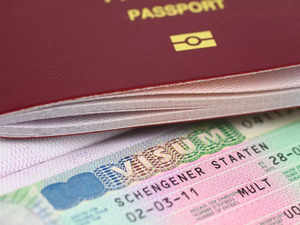
Paris, Milan become the new favourite shopping destinations for travellers after London's 'Tourist Tax'
Schengen visa rule to give more Indians a reason to plan European summers
Visa time for Europe-bound travellers unlikely to fly soon

Read More News on

Five reasons why AI Express employees are up in arms against the airline

500 times return in 4 years: How a Mumbai solar firm found its place in the sun

Satcom in India has two puzzles to solve before taking off

Tens of thousands of Indian gig workers are toiling at the frontiers of AI

Powders and bars are old foam, Indians are voting for liquid soaps

Stock Radar: Consumption stocks on radar! ITC eyeing breakout above 200-DMA; should you buy now?
Find this comment offensive?
Choose your reason below and click on the Report button. This will alert our moderators to take action
Reason for reporting:
Your Reason has been Reported to the admin.

To post this comment you must
Log In/Connect with:
Fill in your details:
Will be displayed
Will not be displayed
Share this Comment:
Uh-oh this is an exclusive story available for selected readers only..
Worry not. You’re just a step away.

Prime Account Detected!
It seems like you're already an ETPrime member with
Login using your ET Prime credentials to enjoy all member benefits
Log out of your current logged-in account and log in again using your ET Prime credentials to enjoy all member benefits.
To read full story, subscribe to ET Prime
₹34 per week
Billed annually at ₹2499 ₹1749
Super Saver Sale - Flat 30% Off
On ET Prime Membership
Unlock this story and enjoy all members-only benefits.
Offer Exclusively For You
Save up to Rs. 700/-
ON ET PRIME MEMBERSHIP
Get 1 Year Free
With 1 and 2-Year ET prime membership
Get Flat 40% Off
Then ₹ 1749 for 1 year
ET Prime at ₹ 49 for 1 month
Stay Ahead in the New Financial Year
Get flat 20% off on ETPrime
90 Days Prime access worth Rs999 unlocked for you

Exclusive Economic Times Stories, Editorials & Expert opinion across 20+ sectors
Stock analysis. Market Research. Industry Trends on 4000+ Stocks
Get 1 Year Complimentary Subscription of TOI+ worth Rs.799/-
Stories you might be interested in
- International
- Today’s Paper
- Premium Stories
- Express Shorts
- Health & Wellness
- Brand Solutions
The top 10 visa-free countries for Indian passport holders in 2024
Visa-free countries for indians in 2024: discover the top 10 best global destinations that indian passport holders can travel to visa-free in 2024..
Many countries worldwide are currently offering visa-free entry to enhance their tourism industry and attract more visitors, including those from India, ensuring a seamless travel experience and eliminating travel obstacles. This initiative has led to a surge in new explorers eager to venture out and discover these countries.
Thailand and Sri Lanka have recently extended their visa-free entry provisions for Indian visitors. Thailand’s extension is in effect until November 11, 2024, while Sri Lanka’s lasts until May 31, 2024. However, in some instances, it is crucial to note that travel to visa-free countries is usually limited to a specific duration and additional documents, such as proof of onward travel or payment of airport taxes might be required.

Indian passport holders currently benefit from visa-free access to 62 countries, simplifying travel and exploration. Visa-free travel allows entry into a country without the need for a prior visa and only requires a passport to clear customs, eliminating the complexities of visa procedures and associated fees.
So, as the summer vacation season approaches, it’s an ideal time to travel. If you hold an Indian passport, there are several destinations you can visit without the hassle of obtaining a visa. Below is the list of the top 10 best global destinations that Indian passport holders can travel to visa-free.
1. Bhutan: 14 days

Bhutan is a neighbouring country of India and is considered one of the top visa-free destinations for Indian passport holders. They can travel for up to 14 days without needing a visa. Often referred to as the Land of the Thunder Dragon, the country is located in the Himalayas and is renowned for its snow-capped peaks, vibrant monasteries, and spiritual culture.

Nepal is a country famous for having Mount Everest, which is the highest mountain in the world. The country is an ideal destination for adventure enthusiasts and nature lovers as it offers a unique and enriching experience with ancient temples, breathtaking landscapes, and amiable locals. Indian passport holders do not require a visa to enter Nepal, as the country shares a friendly relationship with India.
3. Mauritius: 90 days

Mauritius, an island nation surrounded by the Indian Ocean, is a picturesque tropical paradise famous for its pristine beaches, crystal-clear waters, and coral reefs. While many visitors come to Mauritius to experience nature and indulge in luxury resort stays, it can also be an excellent destination for Indian solo or group travellers who want to explore the cities, visit tourist attractions, and try delicious local cuisine. Furthermore, Indian travellers can stay in Mauritius for up to 90 days without a visa, making it an attractive option for those seeking to travel hassle-free.
4. Kenya: 90 days

Starting January 1, 2024, Kenya will allow visa-free travel to Indian passport holders to promote tourism through its electronic travel authorization programme. Exploring its vibrant wildlife and marine reserves, with over 50 national parks to choose from, Indians can travel to Kenya visa-free for 90 days to experience its world-renowned safari experience.
5. Malaysia: 30 days

Malaysia is a magnificent travel destination that offers a blend of ancient rainforests and a multicultural city-life experience. The capital, Kuala Lumpur, boasts the iconic Petronas Twin Towers, one of the tallest buildings in the world. The country is renowned for its exceptional food, historical vibe, gorgeous beaches, and wildlife-packed national parks. Indian passport holders can now travel to Malaysia visa-free until December 31, 2024, as per the latest update. It permits a stay of up to 30 days for each entry and visit to the country.
6. Thailand: 30 days (till November 11, 2024)

Thailand, a gem of Southeast Asia, is famous for its exquisite beaches, delicious cuisine, and lively culture. From the busy streets of Bangkok to the grand temples of Chiang Mai and the tranquil beaches of Phuket, Thailand offers a perfect combination of cultural immersion, adventure, and relaxation. As per the latest update, Thailand has extended its visa-free travel for Indian passport holders until November 11, 2024, which was previously May 10, 2024.
7. Dominica: 6 months

Dominica is a mountainous Caribbean island nation, also known as “Nature Island.” It boasts tropical and balmy weather, natural hot springs, and tropical rainforests. The Morne Trois Pitons National Park is a must-visit place, where you can find a 1,342-metre-high volcano. The country’s best features include the 65-metre-tall Trafalgar Falls and the narrow Titou Gorge. Indian passport holders can easily book flights to Dominica from India to enter this beautiful country. The good news for Indian nationals is that they do not require a visa for either tourism or business purposes for six months.
8. Qatar: 30 days

Qatar is a Middle Eastern country known for its impressive infrastructure and futuristic capital, Doha, with its towering skyscrapers. The country is also recognised as one of the wealthiest nations in the world and is currently in the spotlight for hosting the FIFA World Cup 2022. Indian passport holders can enjoy 30 days of visa-free travel in Qatar.
9. Sri Lanka: 30 days (till May 31st, 2024)

Sri Lanka is the latest addition to the list of visa-free countries for Indians. This South Asian island is rich in history and boasts stunning landscapes, diverse cultures, and incredible wildlife. Visitors can experience beautiful weather and indulge in delicious cuisine. Indian passport holders can travel visa-free to Sri Lanka until May 31st, 2024, as per the latest update. The hospitality of the locals is great, and the country is famous for its sweetmeats.
10. Seychelles: 30 days

The Seychelles are renowned for their stunning waters, coral reefs, sea turtles, and underwater rock formations teeming with beautiful fish, whale sharks, and shipwrecks. The beaches in the Seychelles offer a calm, peaceful, and secluded environment, and Indian passport holders can visit visa-free for 30 days.
- e-Tourist Visa
- Indian passports
- Indian travellers

BMC has announced a water supply shutdown in A ward for 8 hours on May 11 due to a 1,200 meter leakage on Jeevan Bima Marg caused by the ongoing Metro 3 project. The repair work will begin at 9 am and last until 11.30 pm, affecting Colaba, Koliwada, and Navy Nagar areas.
- TN SSLC 10th Result 2024 Live Updates: Tamil Nadu result today, websites to check dge.tn.gov.in, tnresults.nic.in 22 mins ago
- Kerala +2 Result 2024 Updates: 78.69% pass percentage, check results at results.kite.kerala.gov.in 38 mins ago
- Lok Sabha Election 2024 Live Updates: It's vote for jihad vs vote for vikas, says Amit Shah in Telangana 13 hours ago
- GSEB HSC 12th Result 2024 Live Updates: 82.45% pass percentage, check scores at gseb.org 14 hours ago

Best of Express

Buzzing Now

May 10: Latest News
- 01 13 years on, stepfather convicted for murder of actor Laila Khan, 5 of her family
- 02 US believes Rafah operation would weaken Israel’s position in talks with Hamas, says State Dept
- 03 New York City sued for denying gay employees in vitro fertilization coverage
- 04 Delhi HC seeks police stand in bail plea of wife of Delhi govt officer accused of raping, impregnating minor girl
- 05 10 office-bearers of co-operative credit society booked for duping businessman of over Rs 1 crore
- Elections 2024
- Political Pulse
- Entertainment
- Movie Review
- Newsletters
- Web Stories

Visit 6 Gulf nations on ONE visa! Middle Eastern bend of Schengen visa, 'GCC Grand Tours' visa announced
T he Gulf Cooperation Council (GCC) has introduced a Schengen visa equivalent, a new comprehensive tourist visa named "GCC Grand Tours," enabling travellers to explore all six Gulf nations and extend their stay for more than 30 days. This initiative aims to enhance tourism and simplify travel within the GCC region.
Comprising Bahrain, Kuwait, Oman, Qatar, Saudi Arabia, and the United Arab Emirates, the GCC, also known as the Cooperation Council for the Arab States of the Gulf, has launched the GCC Grand Tours visa with the objective of attracting a larger number of tourists by facilitating visits to multiple countries in the region, akin to the Schengen visa of the European Union.
This unified visa is anticipated to significantly boost the tourism industry in the Gulf and increase the influx of hotel guests, ultimately positioning the region as a premier destination for both regional and international tourists.
United Arab Emirates Minister of Economy, Abdulla bin Touq Al Marri, made the announcement following a panel discussion featuring prominent figures from diverse GCC tourism authorities.
The idea of a unified GCC tourist visa has been in progress since October last year, receiving unanimous approval from the GCC states. The aim is to stimulate economic development in the region by simplifying tourist travel. Salem bin Mohammed Al Mahrooq, Oman’s Minister of Heritage and Tourism, confirmed that feedback on the unified visa plan was requested by December 2023.
In April, UAE Minister of Economy Marri emphasised the importance of the unified visa in attracting international tourists and talked about its potential to showcase the region's diverse tourist attractions.
Authorities in the UAE project that the unified GCC tourist visa could lead to a record number of visitors, with estimates suggesting a total of 128.7 million visitors by 2030. This surge in tourism is anticipated to have a substantial impact on the regional economy, creating fresh opportunities for business and cultural exchange, while also elevating the GCC's stature as a top-tier travel destination.
Watch Live TV in English
Watch Live TV in Hindi


IMAGES
VIDEO
COMMENTS
The difference between a Schengen tourist visa and a Schengen visitor visa is the purpose of the visit. For example, you apply for a visitor visa to visit a family member or a close friend who lives in the Schengen Area, while you apply for a tourist visa for tourism or leisure purposes. Usually, a visitor visa requires an invitation letter ...
The holder of a type A visa is not allowed to enter the said Schengen country. 2. Type B Schengen visa. THe type B visa relates to journeys lasting fewer than five days has been replaced by type "C" with the condition "transit". 3. Type C Schengen visa. The short stay Schengen visa is the most common one.
Schengen Visa Types. Description. Validity. Airport Transit Visa (Type A) For passing through the international zone of an airport without entering the Schengen area. 24 hours. Short-Term Visa (Type C) Allows travel across Schengen countries for up to 90 days in any 180-day period. It can be issued for single, double, or multiple entries.
Limited Territorial Validity visa, LTV. It is issued for visiting one specific country or several states specified in the permit. There are three types of uniform Schengen visas: A, B, and C. Category B visas were discontinued in 2010 after the implementation of the EU Visa Code. Type A visa is a transit permit that gives foreigners the right ...
A Schengen visa allows you to travel freely within the Schengen area, comprised of 27 European countries. Non-EU nationals who are visa-exempt and visa-required are allowed to stay in the Schengen zone for up to 90 days within a 180-day period. Schengen visas are single, double or multiple-entry visas.
A Schengen Visitor Visa is a short-stay entry permit issued to visit family members or friends living in any of the Schengen Area member states.It permits its holder to remain in this territory for up to 90 days, within a period of 180 days, and travel throughout the member countries without being a subject to internal border checks.
A Schengen visa is an entry permit for a short, temporary visit of up to 90 days in any 180-day period. A Schengen visa can be obtained in the form of a single-entry visa, allowing the holder to enter the Schengen area once, or a multiple-entry visa, which is granted for several visits to the Schengen area for as long as it is valid.. The short-stay visa calculator can be used to calculate the ...
Schengen Tourist Visa Application Form. The form must be completely filled online, downloaded in two copies and signed at the end. Two photographs in line with the Schengen requirements. They should be no more than 6-months old, 35-40mm in width, close up of your head and top of your shoulders so that your face takes up 70-80% of the ...
The documents you need to provide when entering the Schengen Area are as follows: Valid Passport. Issued within the previous 10 years and valid for at least 3 months after the date you intend to leave the EU. Schengen Visa. If you are a national of one of the third countries needing a visa. ETIAS Entry Authorization.
Visa Fees for a Tourist/Visitor Visa. You will need to pay a visa fee for your application to be processed. As of 2024, the cost of a Schengen visa is €80. However, some categories are exempt from paying the visa fee or have to pay a reduced fee. Make sure you check if you belong to any of them before you pay the fee.
Business / Tourism / Visitor Visa 23.03.2023 - Article. A Schengen visa is required if you intend to stay in the Schengen area for up to 90 days within a 180 day period for business, visitor or tourist purposes.
To apply for a Tourist Schengen Visa, you need to determine the Schengen country where you will be spending the most time on your trip. You will apply for the Tourist Schengen Visa through that country's consulate. Select " Tourism " as a reason for traveling. Determine how many " Entries " to the Schengen area you need.
A so-called "Schengen Visa Type C" is the visa you need to visit Germany for a few days or weeks- it allows you to stay in Germany for up to 90 days within 6 months in total.This is the type of visa you need if, for instance, you are visiting family or friends in Germany, want to travel to Germany as a tourist or for a business trip.
1. Permitted Activities. A Tourist Visa generally restricts individuals from engaging in any form of paid work or business activities. On the other hand, a Visitor Visa allows individuals to participate in a wider range of activities, such as attending business meetings, conferences, or seeking medical treatment.
Your visa. You must apply for a long-stay " visitor " visa. You will be issued with a long-stay visa serving as a residence permit (VLS-TS). This visa is subject to an online validation procedure after you arrive in France. Where appropriate, a temporary long-stay visa (VLS-T) can be issued to people who are certain that they will not extend ...
The application for a German Tourist Visa has to be lodged at the Embassy or Consulate of Germany in the country where you live. Pay the visa fee. The fee of applying for a German Tourist Visa is 80€, while for children of age 6-12 you have to pay 40€, while it is free for those aged 0-6 of age.
Determine where to lodge your visa application. Complete and download the visa application form . Schedule your German visa appointment . Prepare the required documents . Attend your visa appointment . Wait for the visa to process . Collect your passport .
You do not need a visa for short trips to the EU or countries in the Schengen area if both of the following apply: you're staying for 90 days or less in a 180-day period you're visiting as a ...
6. Tourist and visitor visas are one and the same thing. You have to tell the consulate about the purpose of your trip and there are some guidelines about the type of documentation expected based on that but no hard and fast rules or distinct categories of visas. What I think is going on here is a little different.
The first point of entry determines where to submit your application in the following instances: You will only visit (and enter) one Schengen country - in which case, you apply at the Embassy or Consulate of that country. You will visit multiple Schengen countries for the same duration of time - in which case, you apply at the Embassy ...
A Schengen visa costs €80 ($85) for adults and usually takes 15 to 30 days to be processed. For a full list of visa requirements, please consult the VFS Global website. What about tourists from ...
Understanding the upcoming changes to the Schengen Visa fees is crucial for planning your travel, ensuring that exploring the Old Continent remains a dream within reach. Overview of the Schengen Visa. A Schengen Visa allows non-European travelers to cross the borders of 26 European countries with ease, promoting free movement and cultural exchange.
The processing time for a Visiting Family or Friends Schengen Visa is generally about two weeks (15 days). In rarer cases, consulates can take anywhere from 30-60 days to render a decision on an application. Schengen visitor visa for Visiting Friends and Family, Visa Fee, Visa Requirements and Eligibility Criteria for Visitor Schengen Visa.
6. There is no sharp distinction between tourism and business visas in the Schengen area. So if you have a multiple entry visa with long validity it's perfectly fine to use for both purposes and more (business or tourism are only two of half a dozen purposes like medical travel, cultural travel or short studies).
A Schengen visa costs €80 ($85) for adults and usually takes 15 to 30 days to be processed. For a full list of visa requirements, please consult the VFS Global website. What about tourists from ...
Teodora Marinska, COO and Head of Public Affairs at the European Travel Commission, highlighted the benefits of digitizing the Schengen visa application process, making it easier for foreigners to access the bloc. The move aims to address challenges such as limited appointment slots and visa applications due to ease of procedures in certain embassies. Digitalization promises a seamless process ...
So, as the summer vacation season approaches, it's an ideal time to travel. If you hold an Indian passport, there are several destinations you can visit without the hassle of obtaining a visa. Below is the list of the top 10 best global destinations that Indian passport holders can travel to visa-free. 1. Bhutan: 14 days Bhutan (Freepik)
The Schengen visa allows stays of up to 90 days within a 180-day period across 29 European countries. A multiple entry visa, therefore, provides access to the Schengen area for up to 180 days in a ...
Authorities in the UAE project that the unified GCC tourist visa could lead to a record number of visitors, with estimates suggesting a total of 128.7 million visitors by 2030.